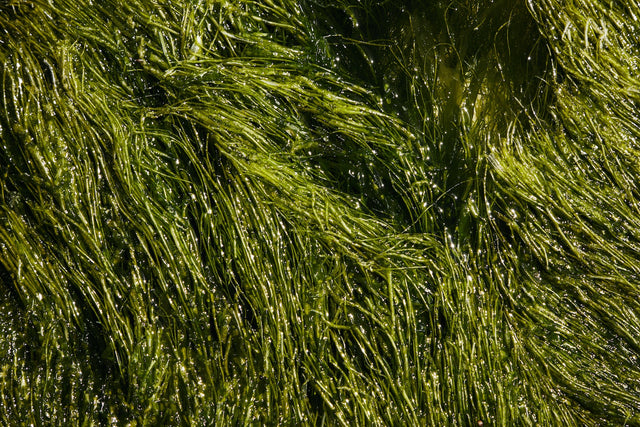Foods
Having a healthy and varied diet is the most important contributor to a healthy mind and body. Why? Because the combinations of the foods you eat and how the nutrients within them are absorbed together is just as important as having the nutrients on their own. Whatever diet you follow, it is important to understand the nutrients you're not getting when you exclude certain foods, and where you can find these nutrients in other foods or through supplements.
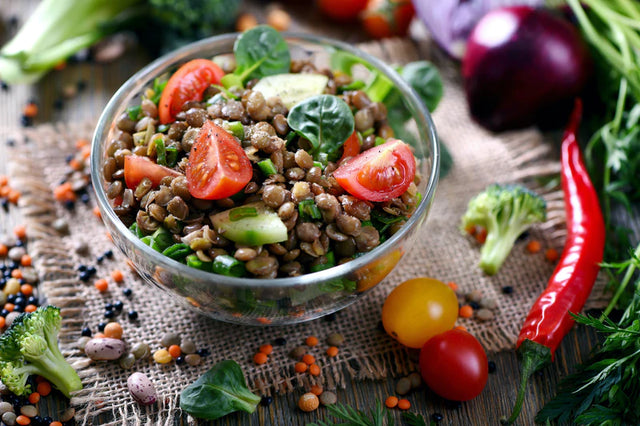
Legumes
Legumes are an edible seed that grows in a pod. Beans, peas and lentils, baked beans, kidney beans, chickpeas, black-eyed peas and red, green, yellow or brown lentils - they're all legumes, rich in fibre and protein, folate (the natural form of Folic Acid), Iron and Magnesium, essential nutrients for your energy, digestion, heart and immunity.
Legumes contain anti-nutrients which can interfere with the digestion and absorption of other nutrients. Phytate is an antioxidant in legumes that impairs the absorption of Iron, Zinc and Calcium from other foods in your meal. Soaking, sprouting and fermenting legumes reduces the phytate content, improving their nutrient value to your body. Fortunately, legumes are often bought in cans and have been soaked and cooked so they're in an optimal form for a salad or to heat up. A typical portion of beans, peas or lentils (approximately 80g) counts towards your 5-A-Day.
Discover our Vegan Magnesium or read our blog 'How do I know if I'm deficient in Magnesium'.
Fruits & Vegetables
Eating our five portions a day of fruit and veg helps protect against heart disease, reduce the risk of some cancers and type 2 diabetes, and helps us maintain a healthy weight. However it's important to remember 5 portions a day should be the minimum and we should all be aiming to eat ten portions a day.
Fruit and veg contain nutrients that help you feel and function well, including Vitamin C for your body to form new tissue; Vitamin A for normal vision, glowing skin and your immune system; Folate for creating red blood cells and many many more. Fruit and veg are also a vital source of fibre which keeps your gut healthy, and helps prevent constipation and other digestion issues. This is why our nutritionist recommend you avoid meal replacement and protein shakes - not only do meal replacement shakes with sweeteners increase the risk of type 2 diabetes, they don't contain the vital fibre that fruit and vegetables provide in their original form that your body needs for optimal gut health.
Nutrients in vegetables are easily destroyed when boiling, so try to steam, microwave, or roast your vegetables to retain more essential vitamins and minerals. Different types and colours of fruit and veg contain different combinations of nutrients, as well as good plant compounds such as phytonutrients (natural chemicals) which are so important to helping us overcome symptoms of menopause, and symptoms of PMS, so it is important to have a variety in your diet.
Discover our Vegan Daily Multivitamin or if you follow a plant-based or vegan diet, learn more about our Vegan Essentials Bundle which includes our award-winning Vitamin B12 and highly absorbable vegan omega-3.
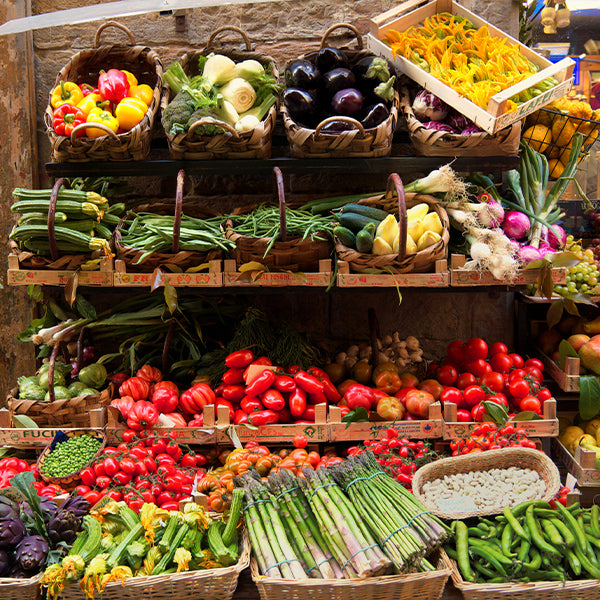
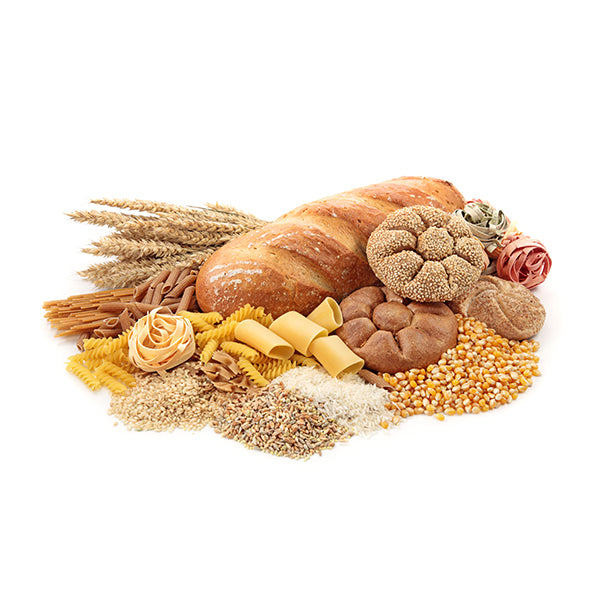
Wholegrains
Grains are high in carbohydrates that provide your body with energy. They are low in fat, contain useful protein and important nutrients including B-Vitamins that help the body use the energy from other foods.
Grains are the seeds of cereal plants such as wheat, barley, oats and rice, and form the basis of foods like breads, pasta, cereals and tortilla. While whole grain breads can be a valuable source of essential nutrients, remember that refined bread is the #1 cause of bloating and digestive discomfort.
The wholegrain is made up of three parts – the fibre-rich outer layer (the bran), a nutrient-packed inner layer (the germ), and a central starchy part (the endosperm). Wholegrains contain up to 75% more nutrients than refined grain (more common) which has had the bran and endosperm removed that contain so much of the goodness. Read the latest gut health research and IBS symptoms and causes revealed.
The biggest benefit of wholegrains is the high fibre content which keeps your digestive system functioning well and can help lower your chances of developing diabetes, heart disease, and several cancers. Wholegrains also include B-vitamins, antioxidants such as Selenium and Vitamin E, and the minerals Copper and Magnesium which support your brain performance, skin health, heart health and energy.
Discover UltraEnergy, our high strength B Vitamin Complex
Protein
Protein is found in every single cell in your body – it's in your DNA! So, protein is not just an essential component of your muscles and vital for growth and repair of your body, it has a major role in controlling your appetite, supporting your immune system, making hormones, carrying oxygen and maintaining a healthy kidney function. Protein also serves as an important back up source of energy when there are not enough other nutrients to fuel your energy.
Proteins are made up of long chains of amino acids. There are about 20 different amino acids found in animal and plant proteins, eight of which are essential and which our bodies can't make, so you need these amino acids in your diet. Protein from plant foods (soya products, quinoa, buckwheat, chia seeds and hemp seeds) contain all the essential amino acids, as do a number of animal sources (meat, fish, eggs, milk and cheese) contain most of the essential amino acids. Make sure you also read our nutritionists important blog on nasty additives to avoid in supplements. Other useful sources of plant protein include nuts, seeds, pulses, mycoprotein, and seitan (wheat protein). Read more in 'Best sources of protein on a plant-based diet'.
If you're on a vegan diet, you can obtain all the protein you need from plant sources. The key is to include a variety of plant proteins, so the combinations provide all the essential amino acids. If you're particularly active, exercising or leading a busy life, a protein supplement can be a convenient way to ensure you are getting enough protein to meet your needs.
Discover our Vegan Magnesium or read our nutritionists' blog: Best protein sources on a plant-based diet.

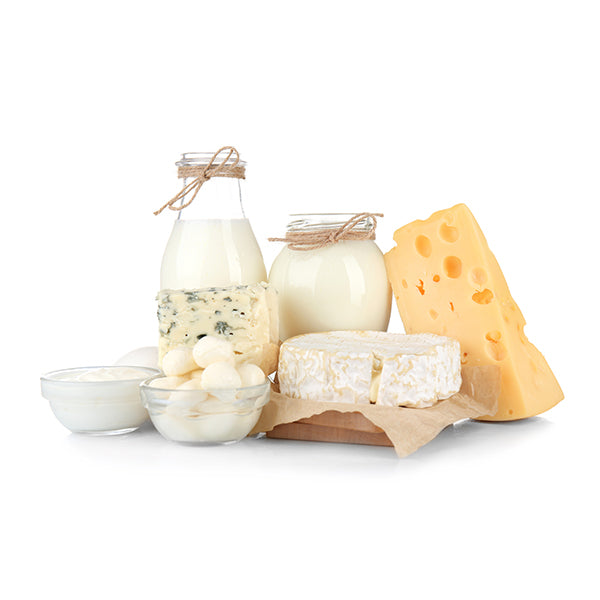
Dairy
If you're on a vegan diet it is important to be aware of the nutrients dairy foods can provide, and the nutrients you need to find through plant sources instead of dairy.
Dairy foods (milk, yogurt and cheese) are sources of protein and essential nutrients such as Calcium, Iodine, Vitamin B2 and Vitamin B12. The Calcium in dairy foods is popular because our bodies can easily absorb it. Dairy does contain some saturated fat (linked with raised cholesterol), however there are some studies that show dairy foods are associated with a reduced risk of heart disease, stroke and type 2 diabetes due to their high calcium content which binds to the saturated fat and prevents your body from absorbing it. Unsweetened and calcium-fortified dairy alternatives like soya milks, yogurts and cheeses can be alternatives to dairy as the protein content is often similar. Learn more in 'The proven benefits of soya' and also beware of the risks of sweeteners in meal replacement shakes and protein supplements.
Discover our Vegan Vitamin B12.
Eggs
Eggs contain important nutrients such as Vitamin D, Vitamin A, Vitamin B2, Vitamin B12, Folate, Iodine and Choline, as well as being a source of protein which is essential for our bodies to grow and repair. Choline in particular is an important nutrient for your liver function and fat metabolism.
While egg whites are higher in protein than the yolks, the yolks are more nutrient dense and contain most of the vitamins and minerals. Although eggs contain some cholesterol, it is the amount of saturated fat in our diet that increases our blood cholesterol levels rather than the cholesterol we get from eating eggs. You may also enjoy reading '5 tips to improve healthy cholesterol'.
Discover our Vegan Choline or learn more in our nutritionists' blog: The benefits of Choline and where to find it.
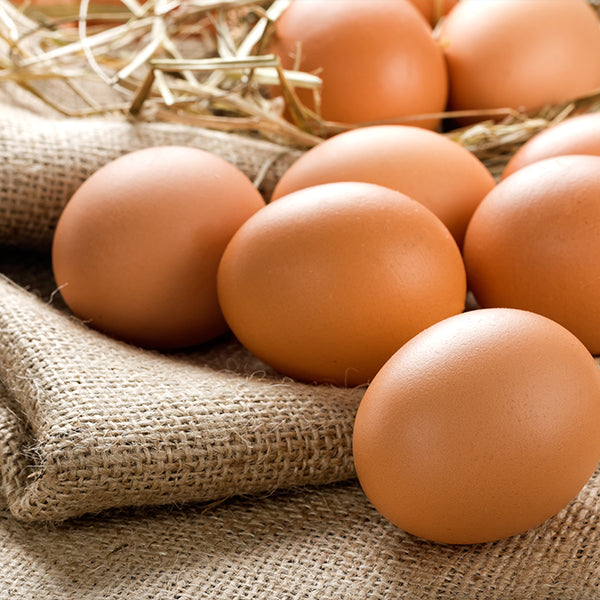
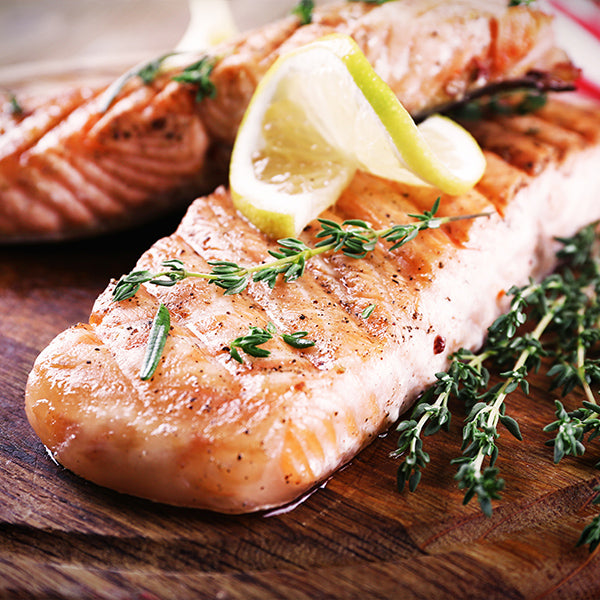
Fish
Fish are a source of essential nutrients such as Iodine, Selenium and Vitamin D, Protein, and healthy fats (known as omega-3 fatty acids). Oil-rich fish, such as mackerel, salmon, trout, herring, sardines and pilchards are high in long-chain omega-3 fatty acids. There is lots of evidence that omega-3 fatty acids benefit your heart health, brain function (concentration, memory and mood) and your eye health and importantly, these vital fatty acids do not need to come from fish! Fish get their omega-3 fatty acids from the algae they eat in the sea, and the fish are more prone to metal pollution in the sea, so you can cut out the middle-fish and enjoy sustainable vegan omega-3 from algae.
Different types of fish and shellfish can provide different types and levels of key nutrients. If you're going to eat fish, eating a variety is not only important as part of a balanced diet, it also helps communities sustain fish stocks. If you're going to eat fish, try to grill, bake or steam your fish – it is healthier than frying which can increase the fat content. Poaching fish can lower some water-soluble vitamins (such as the B-vitamins), but the omega-3 fatty acid content is generally not affected by cooking.
Discover our Vegan Vitamin D3.
Meat
If you've removed meat from your diet it is important to understand the nutrients that meat may have provided, and the nutrients you need to get from other foods or plant-based vegan supplements. Find out what your diet gives you in your free online Diet Profile - it only takes 3 minutes.
Meats such as beef, lamb, pork and chicken are high in protein, and protein is essential for growth and repair in the body. Meats also contain lots of nutrients including Iron, Zinc, Selenium, Vitamin D and Vitamin B12, which all benefit a range of your body's functions including your cognitive health, energy, immunity, skin health and bones. Some of these nutrients are absorbed by your body at different levels depending on whether they're from animal or plant sources, so ensuring you're including plenty of these nutrients is important, and you may need highly absorbable vegan supplements because alternative sources don't provide your body with sufficient levels.
Some meats can be higher in fat, especially saturated fat (which can raise cholesterol levels), so try to choose lean cuts of red meat, chicken without the skin, and trim off any visible fat, all of which can greatly reduce the saturated fat. Learn more in 'Healthy fats and unhealthy fats explained'. Processed meats such as bacon, ham, salami some sausages will increase your risk of serious health conditions such as bowel cancer and type 2 diabetes, so try to limit your consumption of these. Processed meats are also one of the most common causes of bloating and IBS.
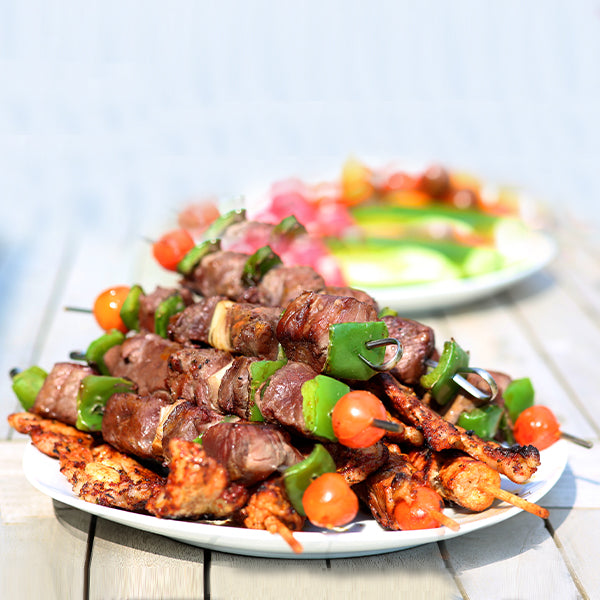
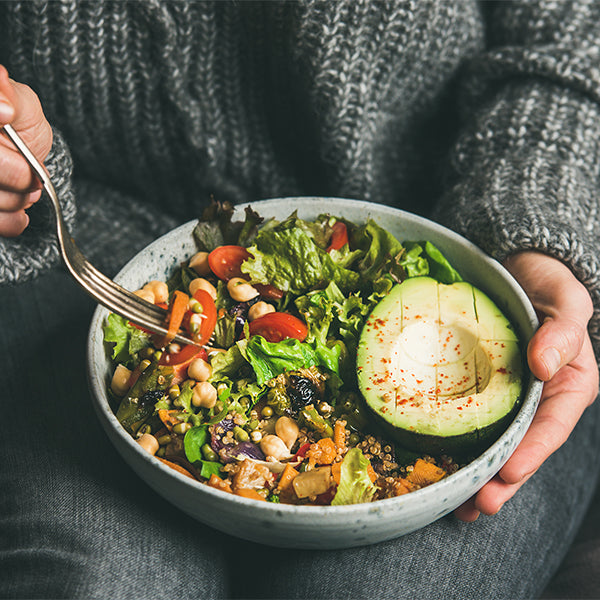
Healthy Fats
Including healthy fats in your diet is vital because healthy fats form part of every cell membrane in the body, they are found within brain tissue that is fed by your gut, bone marrow and help cushion the eye socket. Fat provides us with energy, helps the body absorb fat-soluble vitamins such as Vitamin A, Vitamin D, Vitamin E and Vitamin K, and provides the essential fatty acids that cannot be made by the body. Having too much fat, or the wrong types of fat, can be very unhealthy. You may also enjoy reading 'What are healthy fats?'.
The two main types of fat are saturated and unsaturated. Saturated fats are found in meat, butter, lard, cheese, coconut oil and palm oil - palm oil is one of many nasty additives to avoid in supplements. Saturated fats are considered to be less healthy because they can raise blood cholesterol levels and increase risk of heart disease.
Unsaturated fats include monounsaturated and polyunsaturated fats that are found in plant foods and recipes such as nuts and seeds, olives and avocados. There's LOTS of evidence that swapping saturated fats for unsaturated fat can lower your chances of heart disease.
The two main types of polyunsaturated fats are omega-3 and omega-6. Most plant-based diets include plenty omega-6 fatty acids from vegetable oils, nuts and seeds, but you need to ensure you’re getting adequate omega-3 fatty acids, particularly if you don’t include oily fish in your diet.
Discover our Vegan Omega 3.
Omega 3 Fatty Acids
Omega 3s are a type of polyunsaturated fat referred to as essential fatty acids. The best sources of these are oily fish such as mackerel, salmon and trout as they contain the long-chain omega 3 fatty acids called EPA (eicosapentaenoic acid) and DHA (docosahexaenoic acid). These are particularly beneficial for heart health, optimal brain function and eye health. Learn more in 'What is omega 3 good for'.
There are no plant-based food sources of EPA and DHA, but the body can convert the short-chain omega 3 ALA (alpha linolenic acids) found in plant foods such as hemp, chia and pumpkin seeds, walnuts and rapeseed oil into EPA and DHA. These foods can help maintain normal cholesterol levels.
Although the body can convert ALA into EPA and DHA fatty acids, the process is not very efficient as less than 10% is converted. A vegan omega 3 supplement containing EPA and DHA can be beneficial for vegetarians, vegans or those who don't eat any oily fish.
Discover our Vegan Omega 3 (1,000mg) with 300mg DHA and 150mg EPA.
